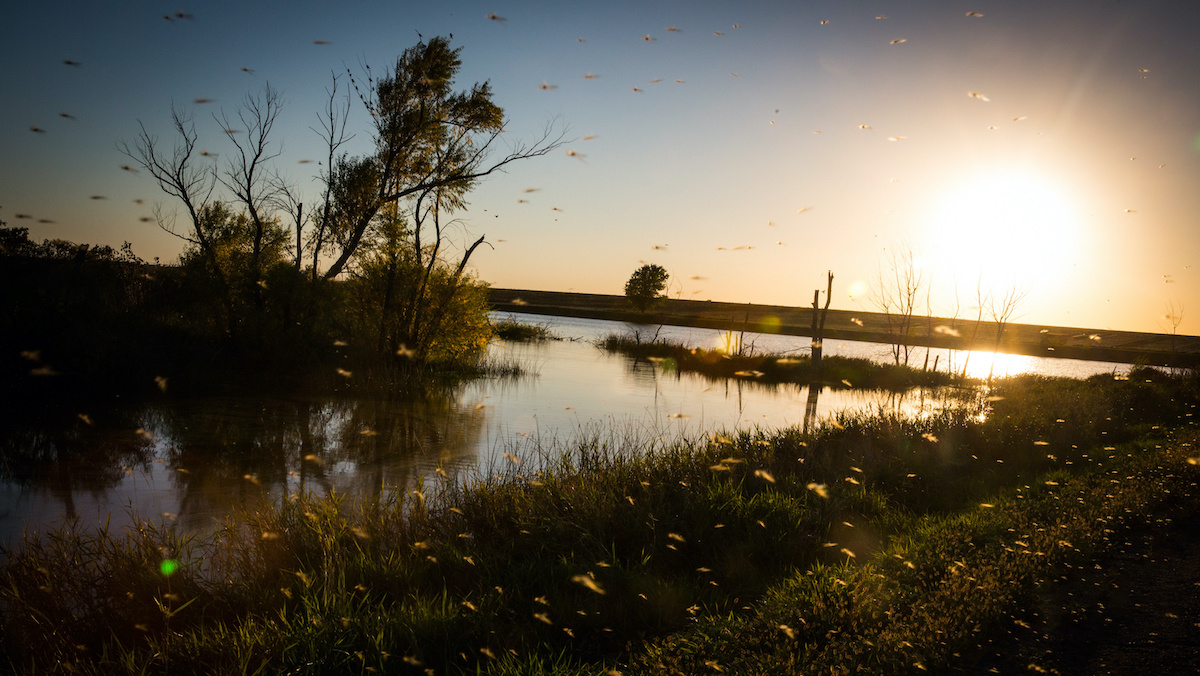
Federal Judge: Pipelines Must Not Cross Streams Without Considering Endangered Species

Gnats hover near a barn equipped with solar panels and a wind turbine on Oct. 11, 2014 in Polk, Nebraska. The barn was built directly in the path of the proposed Keystone XL Pipeline by Bold Nebraska, an organization opposed to the pipeline. Andrew Burton / Getty Images
A federal judge upheld his April 15 ruling Monday, tossing a key permit required by the Keystone XL and other pipeline projects to cross streams and wetlands.
Montana U.S. District Judge Brian Morris affirmed that the U.S. Army Corps of Engineers cannot use a blanket water-crossing permit to approve new oil and gas pipelines without considering their impacts on endangered species.
“The court rightly ruled that the Trump administration can’t continue to ignore the catastrophic effects of fossil fuel pipelines like Keystone XL,” Center for Biological Diversity (CBD) senior attorney Jared Margolis said in a press release. “Constructing pipelines through rivers, streams and wetlands without analyzing the impacts on imperiled species is unconscionable. We’ll continue to fight to protect vulnerable species, our waters and the climate from this kind of reckless development.”
“The court rightly ruled that the Trump administration can’t continue to ignore the catastrophic effects of fossil fuel pipelines like Keystone XL.” – The Center’s Jared Margolis https://t.co/w5KJFJeWi3
— Center for Bio Div (@CenterForBioDiv) May 12, 2020
At stake is a permit called Nationwide Permit 12, which the Army Corps uses to fast-track approvals for construction across waterways, The Associated Press explained.
Morris ruled in April that the Army Corps did not consult with the Fish and Wildlife Service as to how these crossings would impact endangered species when it renewed the permit in 2017, Reuters reported.
Morris’ April ruling was in response to a lawsuit brought by environmental groups focusing on the approval process for the Keystone XL pipeline specifically. However, the ruling blocked the use of Nationwide Permit 12 for all projects, CBD explained.
Utility groups and the government asked Morris to alter his ruling, arguing that it interfered with thousands of construction projects, according to The Associated Press. In response, Morris said that the permit could be used for electrical lines or pipeline repairs, but not the construction of new oil and gas pipelines.
“To allow the Corps to continue to authorize new oil and gas pipeline construction could seriously injure protected species and critical habitat,” Morris wrote, according to The Associated Press.
The ruling does not actually block construction work on Keystone XL or other pipelines, but it is another setback for the long-delayed project, since it now cannot build across streams without further environmental review.
The Keystone XL pipeline would carry around 830,000 barrels of oil a day along 1,200 miles from the tar sands of Alberta, Canada to Nebraska, where it would connect with pipelines traveling to refineries along the U.S. Gulf Coast. It was first blocked by President Barack Obama over fears it would contribute to the climate crisis, but President Donald Trump resuscitated it in 2017.
Pipeline owner TC Energy said it would “promptly” appeal the ruling, according to Reuters.
Other members of the fossil fuel industry also plan to appeal.
“Arbitrarily singling out certain new projects only prolongs the highly disruptive nature of this order,” Amy Conway of the Interstate Natural Gas Association of America told The Associated Press.
But environmental advocates thought the law was on Morris’ side.
“Our courts have shown time and time again that the law matters,” Natural Resources Defense Council (NRDC) attorney Cecilia Segal said in the CBD Press release. “Today’s ruling makes clear that climate-busting pipelines like Keystone XL cannot be built until the federal government does its job and properly analyzes these projects’ devastating effects on their surrounding communities and wildlife. If that analysis is based on science and facts, pipelines like Keystone XL will never see the light of day because they remain, and always will be, a dire threat to our water, wildlife and climate.”
- Judge Tosses Major Keystone XL Permit - EcoWatch
- Keystone XL Pipeline Construction to Forge Ahead During ...
- Construction Begins on Keystone XL Pipeline in Montana - EcoWatch

 233k
233k  41k
41k  Subscribe
Subscribe 